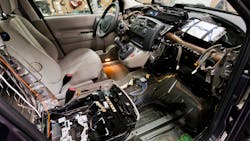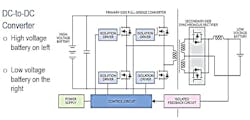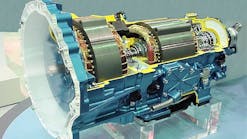Vehicles are reliant on an extensive network of controllers, electronics, wiring, computers and coding that controls everything from fuel management, transmission shifts, ABS, stability control, TPMS sensors and more. This creates a huge revenue opportunity for vehicle repair shops and technicians. According to Justin Fisette of Bosch Automotive Service Solutions, electrical work is a significant revenue opportunity because of the volume of work. “Consumers expect more of their vehicles and with autonomous driving on the horizon, vehicle repair will center on electronics as drivers put on more miles and vehicles last longer,” Fisette says.
“Many techs shy away from electrical diagnostic testing,” adds Ron Kirsch, a Snap-on private label meter supplier. “It can be a frustrating and time consuming job if you do not have the right test equipment and experience. Electrical systems and components continue to grow in popularity. Some techs send that type of work to other shops or do not fix the problems correctly. That opens up new opportunities for those that learn how to complete electrical work well.”
Electrical work has grown to be a major repair category, with increasingly complex tools to pinpoint and verify vehicle problems. “In the past, you really only needed a multimeter, circuit tester and maybe a few probes to check wiring connections. Now, specialized test equipment is needed to fix the vehicle correctly and avoid comebacks. The emergence of hybrids, electric vehicle and high-voltage systems also require more electrical system testing, training and knowledge,” Bosch’s Fisette says.
This is a rapidly changing and growing repair category, which can make electrical service difficult and proves the value of experienced, knowledgeable technicians. New technology such as automatic emergency braking, lane keep assist, lane departure warning, adaptive cruise control and automated driving technologies rely on electrical systems, and will need to be diagnosed and repaired. These systems and technologies continually evolve to become more efficient, convenient and cost effective.
“More and more electronics on vehicles like cameras, video equipment, evasive action sensors, alarms, etc. will require more electrical repair,” Snap-on’s Kirsch says. “These will require even more sophisticated repair and diagnostic skills.”
Having access to the correct electrical system diagnostic tools can help increase revenue for the shop or for technicians by helping technicians diagnose vehicles faster. Diagnosing complex electrical systems is one of the hardest parts of electrical system work. Diagnostic equipment helps ensure that technicians are only replacing the parts that need to be replaced, not replacing a part only to find out that it was actually an issue further down the electrical circuit. Tools that include repair info, vehicle data, wiring diagrams, likely fixes and test parameters can help technicians ensure accurate electrical system diagnostics.
Tools that are currently available for electrical system work include battery and charging system testers, battery monitor reset tools, battery chargers, oscilloscopes, digital multimeters, scan tools, specialty electrical system test tools and circuit testers.



